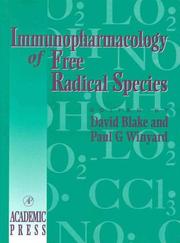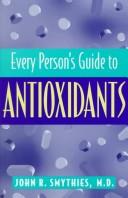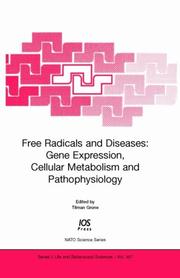| Listing 1 - 10 of 43 | << page >> |
Sort by
|
Book
ISBN: 1536101826 9781536101829 9781536101812 1536101818 Year: 2016 Publisher: Hauppauge, New York : Nova Science Publishers, Incorporated,
Abstract | Keywords | Export | Availability | Bookmark
 Loading...
Loading...Choose an application
- Reference Manager
- EndNote
- RefWorks (Direct export to RefWorks)

ISBN: 9780121035204 0121035204 9780080534541 0080534546 1281076775 9781281076779 9786611076771 Year: 1995 Publisher: San Diego Academic Press
Abstract | Keywords | Export | Availability | Bookmark
 Loading...
Loading...Choose an application
- Reference Manager
- EndNote
- RefWorks (Direct export to RefWorks)
Free radicals have been implicated in a entire host of different human disease states, which suggests that although they may not have a pivotal causal role, they are involved in the perpetuation of disease. In recent years, it has become evident that although free radicals most certainly do have this role in perpetuating inflammatory reactions, they have perhaps a far more important role in acting as second messenger systems to maintain normal cell function. It is the perturbations of these reactions which pose the most intriguing therapeutic challenges.
Book
Year: 2020 Publisher: London : IntechOpen,
Abstract | Keywords | Export | Availability | Bookmark
 Loading...
Loading...Choose an application
- Reference Manager
- EndNote
- RefWorks (Direct export to RefWorks)
Although free radicals perform some useful immune functions, they can also damage healthy cells through a process called oxidation. Antioxidants reduce the effect of free radicals by binding together with these harmful molecules, decreasing their destructive power. This book highlights various issues of free radical biology from the perspective of antioxidant defense mechanisms. It also provides useful information on gene modulation, radiation-generated reactive oxygen species-induced apoptosis in cancer, and environmental aspects associated with free radicals' exposure on living systems.
Book
ISBN: 1617619191 Year: 2010 Publisher: New York : Nova Science Publishers,
Abstract | Keywords | Export | Availability | Bookmark
 Loading...
Loading...Choose an application
- Reference Manager
- EndNote
- RefWorks (Direct export to RefWorks)
Free radicals (Chemistry) --- Radicals (Chemistry) --- Pathophysiology.
Book
Year: 2012 Publisher: [Saif Zone, Sharjah, U.A.E] : Bentham Books,
Abstract | Keywords | Export | Availability | Bookmark
 Loading...
Loading...Choose an application
- Reference Manager
- EndNote
- RefWorks (Direct export to RefWorks)
This E-book covers both the fundamental principles and the recent advances in free radical biomedicine. It also provides a detailed coverage of the commonly used methods in free radical research with detailed illustrations.
Free radicals (Chemistry) --- Pathology, Molecular. --- Physiological effect.

ISBN: 0813556155 0585023085 9780585023083 0813525748 0813525756 Year: 1998 Publisher: New Brunswick, N.J. Rutgers University Press
Abstract | Keywords | Export | Availability | Bookmark
 Loading...
Loading...Choose an application
- Reference Manager
- EndNote
- RefWorks (Direct export to RefWorks)
What are antioxidants? What do they do? Should you be taking them? How much is enough, or too much? Dr. John Smythies explores these and other questions you need to have answered about antioxidants in Every Persons Guide to Antioxidants. Oxidants are naturally occuring chemicals in our bodies that derive from oxygen to facilitate essential biochemical processes. However, most oxidants are potentially toxic molecules and the body contains a number of antioxidants for protection against these toxic effects. Overproduction of oxidants, or underproduction of antioxidants, leads to oxidative stress, which has been linked to a wide range of chronic diseases, including heart disease, cancer, diabetes, and Alzheimers. Smythies thoroughly evaluates current scientific work on this subject and suggests that a high proportion of many of these diseases can be prevented, or their onset delayed, by proper intake of antioxidants. He examines the pros and cons of the debate over how this necessary intake should be achieved, by eating more fruits and vegetables or by taking supplements in pill form. Smythies surveys the toxicity of antioxidants and recommends under what circumstances they should be given with caution or not at all. He also discusses whether taking supplements requires medical supervision and lists good sources of antioxidants in fruits and vegetables
Oxidation, Physiological --- Antioxidants --- Free Radicals (Chemistry) --- Science --- Medical --- Oxidation, physiological --- Free radicals (chemistry)

ISBN: 1280504854 9786610504855 1429401990 160750118X 6000004303 1601290993 9781429401999 9781601290991 9781607501183 9781586035181 1586035185 1586035185 Year: 2005 Publisher: Amsterdam Oxford IOS Press
Abstract | Keywords | Export | Availability | Bookmark
 Loading...
Loading...Choose an application
- Reference Manager
- EndNote
- RefWorks (Direct export to RefWorks)
This publication contains an extensive overview of free radicals and diseases, including both basic science approaches and clinical applications. The research of the last decades has contributed substantially to the understanding role and function of these metabolites. It is the aim of the editors to include a large variety of biological models ranging from yeast over mitochondria, isolated cells and cell culture models to animals and humans. The topics discussed focus on the function and integrity of mitochondria under oxidative conditions, the role of protein oxidation and proteolysis in the
Free radicals (Chemistry) --- Active oxygen --- Pathophysiology. --- Free radicals --- Gene expression --- Cellular metabolism --- Pathophysiology
Book
ISBN: 9781613248126 1613248121 9781613247181 1613247184 Year: 2012 Publisher: New York
Abstract | Keywords | Export | Availability | Bookmark
 Loading...
Loading...Choose an application
- Reference Manager
- EndNote
- RefWorks (Direct export to RefWorks)
Antioxidants --- Free radicals (Chemistry) --- Skin --- Radicals (Chemistry) --- Free radical reactions --- Therapeutic use. --- Aging.
Periodical
ISSN: 13084178 Year: 2008 Publisher: [Isparta, Turkey?] : [publisher not identified]
Abstract | Keywords | Export | Availability | Bookmark
 Loading...
Loading...Choose an application
- Reference Manager
- EndNote
- RefWorks (Direct export to RefWorks)
Cell membranes --- Free radicals (Chemistry) --- Free Radicals. --- Cell Membrane. --- Ion Channel Gating. --- Ion Channels. --- Oxidative Stress.
Book
ISBN: 9535127470 9535127462 9535141651 Year: 2016 Publisher: IntechOpen
Abstract | Keywords | Export | Availability | Bookmark
 Loading...
Loading...Choose an application
- Reference Manager
- EndNote
- RefWorks (Direct export to RefWorks)
The current volume entitled, ""Free Radicals and Diseases"" integrates knowledge in free radical-associated diseases from the basic level to the advanced level, and from the bench side to bed side. The chapters in this book provide an extensive overview of the topic, including free radical formations and clinical interventions.
Free radicals (Chemistry) --- Radicals (Chemistry) --- Free radical reactions --- Life Sciences --- Microbiology --- Genetics and Molecular Biology --- Biochemistry --- Cancer Biology
| Listing 1 - 10 of 43 | << page >> |
Sort by
|

 Search
Search Feedback
Feedback About UniCat
About UniCat  Help
Help News
News